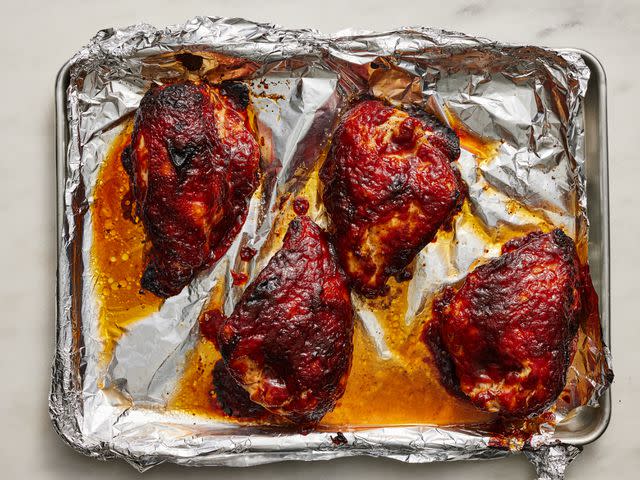Read This Before Cooking With Aluminum Foil
Is it even safe to wrap food and line the grill?
Aluminum foil is a kitchen staple. But you may have heard that high-heat oven cooking might transfer chemicals present in foil into your food. Is this true, and should you be worried about what impact that presents on your health?
What Is Aluminum?
Aluminum is a naturally occurring element found all around us in our air, water as well as manufactured products such as antiperspirants, cosmetics, and medications. Most often, we consume aluminum in our food, with the most amounts coming from cooking utensils or products such as aluminum foil. According to the USDA website, foil in the United States is comprised of "98.5% aluminum with the balance primarily from iron and silicon to give strength and puncture resistance". Aluminum foil is also freezer-safe and recyclable, depending on local regulations.
Risks of Cooking With Aluminum Foil
During the 1960s and 1970s, there was a concern that cooking with aluminum pans or drinking out of aluminum cans caused Alzheimer's disease, but no link has been discovered. While there aren't any definitive links to diseases caused by higher amounts of aluminum in your diet, according to the National Institute of Health, high temperatures or cooking with salt, vinegar, or highly acidic ingredients are likely to cause aluminum transfer into your food. The amount is generally considered safe and not harmful since the majority of the aluminum will pass through the digestive tract and ultimately end up in the toilet.
That said, another recent study shared the "high potential risk to people with certain ailments (especially people suffering from chronic renal failure) and smaller children." It also noted that different foods carry different levels of potential aluminum absorption.
Generally, foods that are less acidic, less salty, and contain less liquid tend to absorb lower amounts of aluminum. On the flip side, marinated meat and/or fish with lemon tend to absorb more during cooking with foil.

Alexandria Yorke
Is It Safe to Cook With Aluminum Foil?
Aluminum foil is safe to use up to 400 degrees F (200 degrees C) in the oven and for direct-heat grilling. For additional consideration, one study found food baked in aluminum foil at lower temperatures (below 325 degrees F/160 degrees C) measured a lower leakage of aluminum versus those baked at higher temperatures (over 425 degrees F/220 degrees C).
Keep in mind that lining your oven with aluminum is not recommended, as it could damage the oven's heating elements. If you're worried about drips or spills, place your dish or item on a sheet pan covered in aluminum foil to avoid mess. High-heat cooking can also be done safely on parchment paper, up to 425 degrees F (220 degrees C).
For safe grilling, use aluminum foil packets or containers as directed.
The Bottom Line
The amount of aluminum that enters food from high-heat cooking is considered safe to eat, though recent studies show amounts are nearing the "tolerable weekly intake." It is important to be aware and to stay on top of changing recommendations. If you're trying to avoid excess added chemicals in your diet for any reason, try using lower heat or parchment paper instead.
Read the original article on All Recipes.

 Yahoo Lifestyle
Yahoo Lifestyle 
